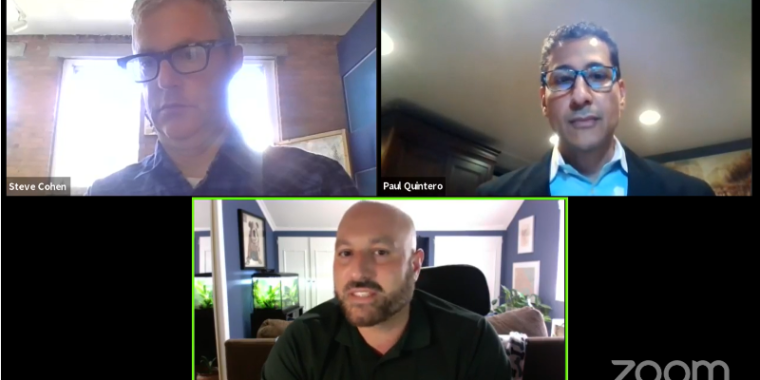
Long-Term Care, Trusts, Insurance, are Topics at Sanders' Community Clergy Breakfast
December 21, 2015

State Senator James Sanders Jr. (D-Rochdale Village) held a Community Clergy Breakfast on December 18th at Calvary Baptist Church in Jamaica, bringing together faith-based leaders, as he does every month, to learn from experts about topics that are pertinent to them and their congregations.
December's special guests were Doneath Powell and Alan Au of Flushing Bank, who explained the different types of life insurance that are available, long-term care insurance and the benefits of having a trust.
"We are going to learn some very good information today," Sanders said. "Although most of us do not want to think about a time when we won't be around anymore, or a time when we will need someone else to care for us, it is important and necessary to plan for the future."
The basic reason for having life insurance is to safeguard loved ones from financial expenses that can be left behind after one's death such as funeral costs, estate taxes, and continuing mortgage payments. There are two major types of life insurance policies - whole life, and term life. While the former is more expensive, it has its advantages over the latter.
Whole life insurance provides protection for the entire life of the policy holder as long as they have paid their premiums and the policy hasn't lapsed. Another benefit to this type of insurance is that it builds internal cash value, money that can be used to pay premiums, take loans or make withdrawals. It's also the amount you would receive if you surrendered, or liquidated, the policy.
Term life Insurance provides protection for a specific period of time. If you die during the coverage period, your beneficiary collects the policy death benefit. If you don't die, the beneficiary gets nothing, and you must apply for a new policy after the existing one has ended.
In addition to life insurance, long-term care insurance is also an important safeguard to obtain, because you never know when, whether due to accident or age, you will need assistance performing every day life activities, such as eating, dressing or bathing.
"If you were to stay in a nursing home, it would cost you about $100,000 a year," Au explained. "It is quite expensive. Now, what happens if you have to go into a nursing home or hire an in-home nurse? An in-home nurse might be cheaper, maybe $5,000 a month, but still, you are depleting your assets. Long-term care insurance helps protect against that."
Long-term care insurance helps cover the cost of extended health care that is not typically covered by health insurance, Medicare or Medicaid, and generally includes in-home nursing care, adult day service centers, hospice care, respite care, assisted living facilities, Alzheimer's special care facilities and nursing homes.
The next topic was trusts. A trust is a legal arrangement whereby someone's property or money is managed by someone else. There are revocable trusts, ones where the grantor can change the provisions, Powell explained, and irrevocable trusts, ones where they cannot. In the case of the latter, Powell had some words of warning.
"Is this someone you can trust to manage your money?" she advised the crowd to ask themselves. "My suggestion is to set up yourself as the trustee and your children or your heirs as successor trustees, because you do not want to be in a situation where you set up a trust and someone else is managing it, and you don't have access to your money, because they decide you don't need it."
For more information on life insurance, long-term care and trusts, one can consult a reputable attorney or financial planner.
We would like to thank this month's breakfast sponsor, ConEdison.
Share this Article or Press Release
Newsroom
Go to Newsroom
Understanding Why Some Groups Sabotage Protests
July 31, 2020


